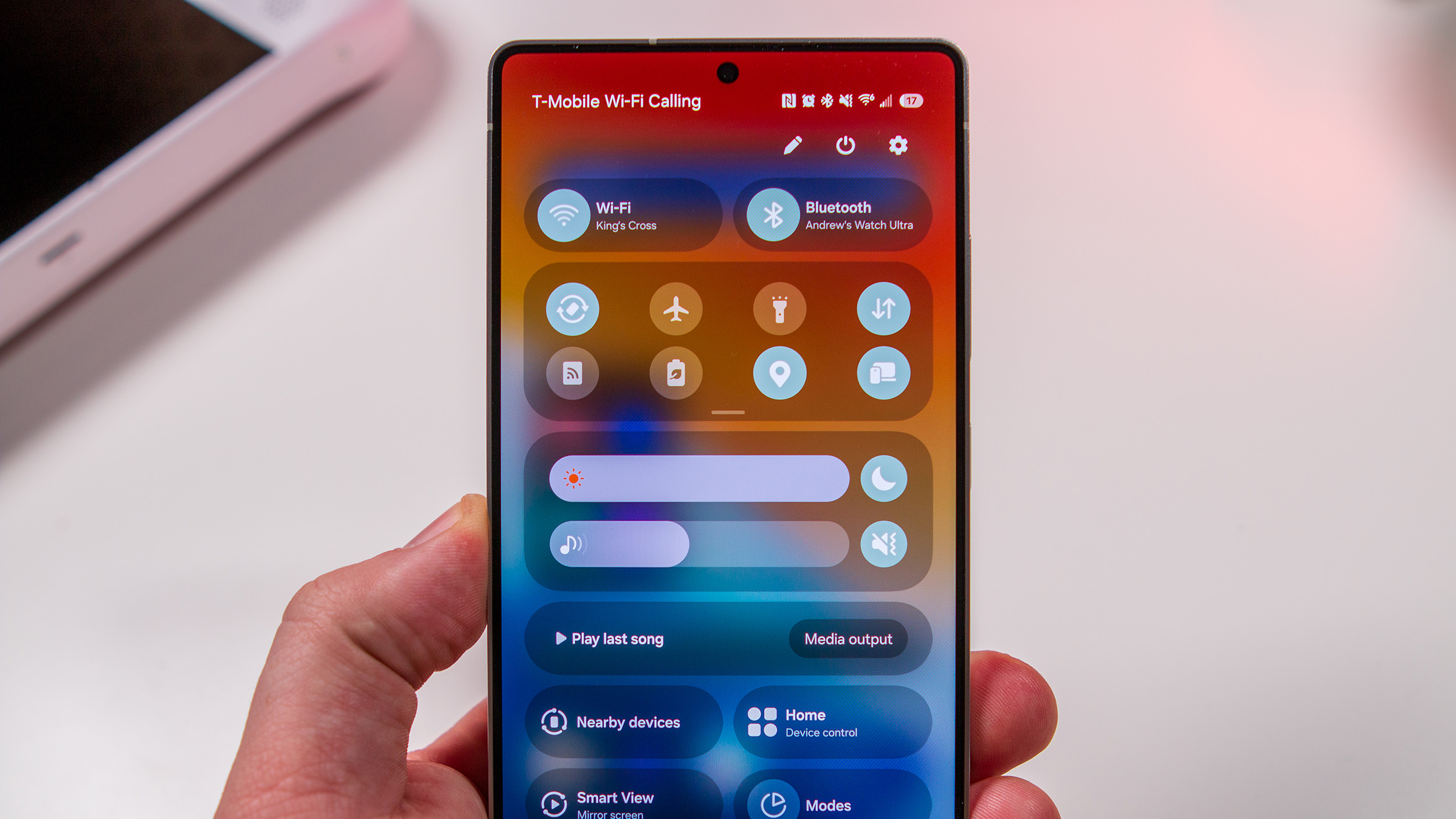Verizon HTC Droid Incredible Review
Over the past six months, the Droid -- and its slightly scary "DROID!" battle cry -- has become the public face of Android smartphones. Today, we bring you the latest in the line -- the Verizon Droid Incredible, which will be available starting April 29 (you can preorder it now) for $199 with a two-year contract.
Special Coverage:
HTC Droid Incredible on Verizon
- Verizon HTC Droid Incredible review
- Unboxing and hardware hands-on
- Software and Sense UI video walkthrough
- Incredible vs. the Evo 4G and Nexus One
- Droid Incrediblescreen shots
- Verizon's Droid Incredible announcement
The Droid Incredible (henceforth simply the Incredible) is a kinder, more gentle smartphone than Motorola's initial offering. It also replaces the Droid Eris -- both devices are manufactured by HTC and feature large touchscreens in lieu of a keyboard.
And the Incredible brings with it the latest version of the Sense user interface, making Android even easier, more customizable and more eye-pleasing than ever.
The buildup leading to the announcement and release of the Incredible has kept the Android faithful in a frenzy for weeks, and the phone should be a strong attraction for those looking for their first smartphone, or for those looking to make the switch to Android.
Click on through for our impressions as we take a look at the Incredible and see if it lives up to its name.
Be an expert in 5 minutes
Get the latest news from Android Central, your trusted companion in the world of Android
The hardware
Fit and finish
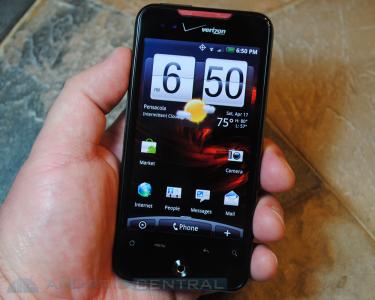
The Incredible is a close relative of the HTC Desire, which is currently available in Europe. Think of the two as fraternal twins. Same 3.7-inch AMOLED touchscreen at 480x800 pixels. Same 1GHz Snapdragon processor. (Previous rumors of the processor being underclocked are not true.) Memory is close enough at 740MB of ROM and 512MB of RAM. Android 2.1 is skinned with the latest version of HTC's Sense user interface. There's an optical trackpad ringed by a physical button. Size (4.6 x 2.3 x 0.47 inches) and weight (4.6 ounces) are nearly identical.
The Incredible is your basic "black slab" -- or think of it more like the obelisk from "2001: A Space Odyssey." The bezel around the screen remains a glossy black, contrasted by the garnet earpiece. It's striking, really.
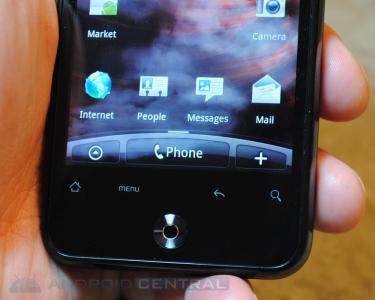
Four capacitive buttons (meaning there's not actually anything to press down) rest just below the touchscreen, arranged in HTC's standard home-menu-back-search layout. Below the capacitive buttons is a small "optical joystick" (it's not actually a trackpad as found on the new BlackBerries) that's ringed by a button -- the only thing that actually moves on the front of the device.
Like with the HTC Desire and Legend, this "optical joystick"-button combination is much more stylish than the outdated trackball that you can find on the T-Mobile G1 -- the very first Android smartphone -- as well as on the Google Nexus One. It allows for a much more continuous design while providing acute selections -- meaning you'll likely only use it when moving a cursor a space or two and when selecting text to copy and paste. (Outside of that, we could well live without it.)
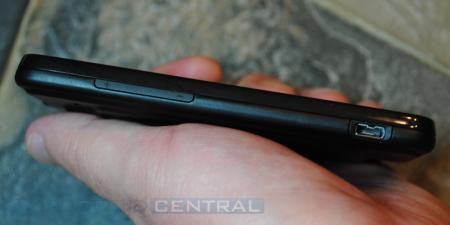
The left-hand bezel of the phone has the volume up-down rocker button and the microUSB port used for charging, syncing and tethering. A power button and standard 3.5mm headphone jack are on top of the Incredible. On the bottom bezel are the pinhole microphone, a very tiny hole to which you can attach a phone charm (no, it's not a noise-canceling microphone), and the slit used to pry open the battery cover.
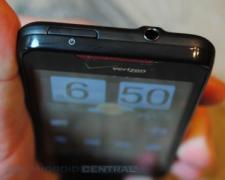
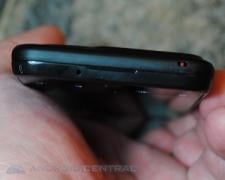
The screen
The Incredible has a 3.7-inch capacitive AMOLED touchscreen. AMOLED screens use less from the battery and have (arguably, some say) better and brighter colors than traditional LED screens. Your mileage my vary. Whites sometimes don't look as white as we'd like, and AMOLED screens are notorious for being nearly unusable outdoors. Side-by-side with the Nexus One, with the brightness turned to maximum on both phones and ambient light sensors turned off, the Incredible's screen was about as good (or as bad) outdoors.
The battery
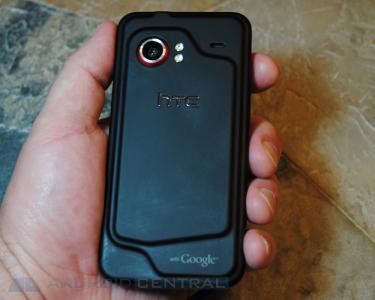
Turning the phone over, you see the triple-decker battery cover. That's mostly a design aesthetic, and it's one that has had many of you scratching your heads. You can take it or leave it, we suppose, but it is not obtrusive and adds some three-dimensional character -- along with the garnet accents, of course -- to an otherwise drab black slab. And speaking of the garnet accent, it's on the rear of the phone, too, ringing the 8-megapixel camera lens. There are dual flashes (for the sake of brightness) and a small opening for the speaker phone.
The battery cover itself takes up the entire back face of the phone and is of the soft-touch variety, which will help you keep a grip on it. It has to be pried off starting at the bottom bezel. If you don't have fingernails, you're in trouble here.
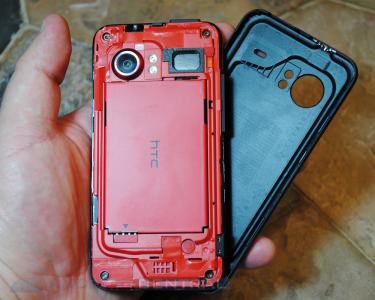
Once you get the battery door off, you're blasted by an almost fire-engine red -- everything save for the speakerphone grille is screaming "look at me!" That includes the battery itself, which is spec'd at 1300 milliampere-hours. Getting through a full day of heavy use will be tight, so an extra battery may be worth a purchase, and we should see third-party extended batteries soon enough. Also under the battery cover is the aforementioned microSD card, which you can swap in and out without removing the battery -- a welcome find.
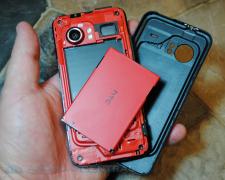
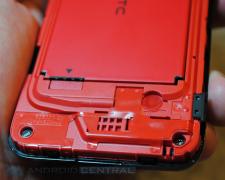
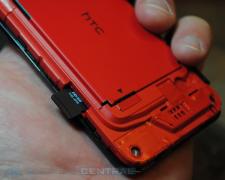
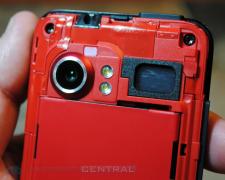
Processor, ROM/RAM
The Incredible sports a 1GHz Qualcomm Snapdragon processor. That's par for the course for a top-of-the-line smartphone, especially one with a screen this size. Same goes for the 512MB of RAM and 740MB of ROM. The bottom line is you're really going to have to work at it if you're tying to bog down the Incredible. (Updated 4/21: The phone actually reports having 748MB of "phone memory," while every spec we've received shows 512MB of ROM. HTC tells us that apps can be installed to the entire 748MB.)
Operating system
But what's all that horsepower matter if you don't have a cart to pull, right? As such, the Incredible is running Android 2.1, the most recent version of the "Eclair" line of the Android operating system, including live wallpapers and voice-to-text, among other behind-the-scenes features. On top of that is HTC's "Sense" user interface. (More on that in a bit.)
Storage
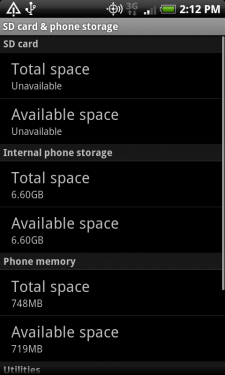
To sweeten the deal, there's an extra 6.6 gigabytes of storage (which for some reason Verizon is still reporting as 8 gigs, even with a footnote explainer) that you can use for music, video, photos, whatever. (At the time of this writing, apps are still constrained to the 512MB of ROM -- more than enough for more people, but something Google has promised to address in future updates to Android.)
And on top of that, Verizon's including an 8GB microSD card, and the phone can handle up to a 32GB card. You'll run out of battery long before you'll run out of music. (Side-effect: When you mount the Incredible as a disk drive, you actually see two -- one for the internal memory, and another for the microSD card.)
The software
HTC Sense user interface
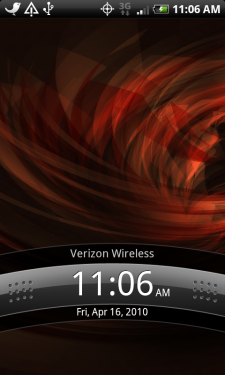
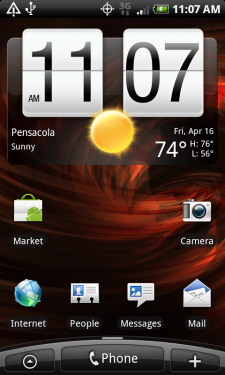
The Incredible features the latest version of HTC Sense, with its distinctive large flip clock and weather info front and center. It's the same in look and feel as we saw on the HTC Desire. (Check out our previous review of Sense.) If you're new to Sense (or Android), think of it as a custom skin on top of Android that makes your smartphone experience easier, more attractive and more enjoyable.
Some of the highlights of Sense include:
- Footprints: A photo geotagging (location) app and widget.
- Friend Stream: Bringing Twitter, Facebook and Flickr all under one roof.
- Peep: HTC's own Twitter client.
- Weather: HTC is famous for its weather app and widget, and it's included here as well.
- Custom home screens: Read on.

Sense also brings you an almost silly number of home screens. Where the Droid only has three and the Nexus One has five, Sense cranks things up to seven. And that's just for starters. You also have seven "scenes" -- preloaded groups of seven home screens -- from which to choose, and you can save your own custom scenes as well. That means you can have one scene for workdays, with calendar widgets and e-mail widgets and all the bells and whistles that keep you functioning. And with a couple of simple taps, you can leave all that behind with a different scene, say, one that has HTC's custom music player, Friend Stream to see what your pals are up to, and a text message widget so you don't miss a beat.
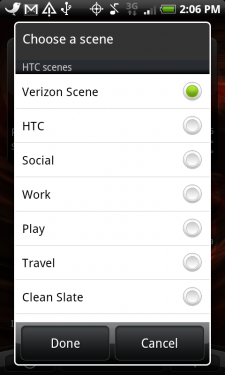
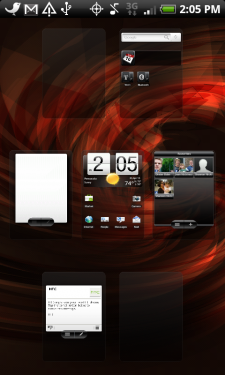
The new Sense also has the "Leap" function. From any of the home screens, place your thumb and index finger and spread them apart or pinch them together and you'll see all seven home screens on one page, so you can quickly select the one you need. It's a handy feature, especially if you want to go from the extreme left home screen to the extreme right without swiping through five others. (You can also get to Leap by pressing the home button when at the center home screen.)
The keyboard
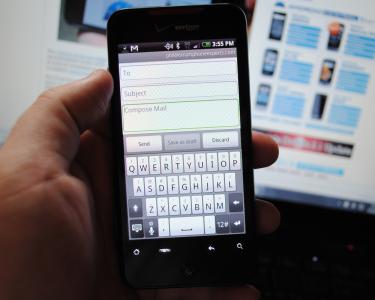
The Incredible doesn't have a physical keyboard like the Motorola Droid, so you're going to be typing everything on the screen. And as far as onscreen keyboards go, HTC has one of our favorites. (See our recent keyboard roundup for more.)
A new feature in Android 2.1 is the ability to speak and fill any form. In other words: You can dictate an e-mail. A text message. A search query. Basically, anything. And it works just fine on the Incredible. Also present is what's known as "haptic feedback," which is a fancy way for saying the phone vibrates when you press a key. Haptics also are turned on for the home, menu, back and search buttons on the face of the phone.
Apps
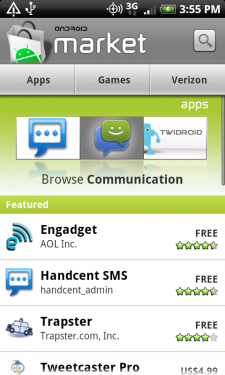
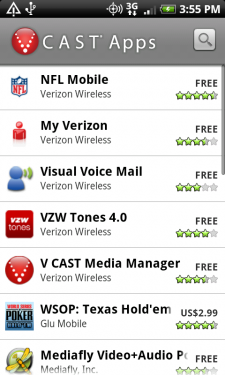
A smartphone's only as good as the applications it has available. To that end, there's the Android Market, which now has more than 38,000 apps -- that number includes keyboards, wallpapers, ringtones, etc., as well as standard applications and games -- there for the taking, free and paid. Verizon has its own section as well.
The app drawer
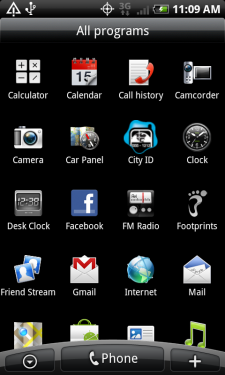
Also known as the launcher, the app drawer experience is a little different in Sense. At the bottom of every home screen in Sense are three buttons. The phone button is the largest and is in the center. It's nice having quick access to this from every home screen without having to go pecking for an icon. To the right is a + button. Tap it and you can add widgets, shortcuts, programs or folders to the home screen. And to the left is the apps button, which looks like a circle with a triangle in it. Press it and you get the app launcher. And, no, it's not the cool 3D scrolling launcher you get with the Nexus One. Sorry.
Widgets
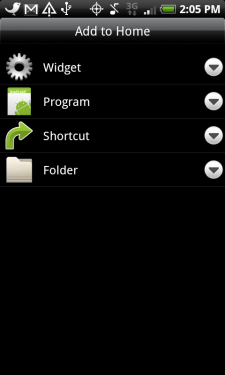
If you're new to Android, it's time to get used to widgets living alongside icons. Think of a widget as a home screen app. The big ol' clock on the home screen is a widget. Swipe left or right to the other home screens, and you see more widgets. Widgets can simply display information, or you can tap them to launch programs. For example: Tap the clock on the main home screen and you're taken to the clock app. From there you have access to the desk clock, world clock, alarm, stopwatch and timer.
To add a new widget, hold down on the home screen, or tap the + button. You could spend weeks playing with all the options. To delete a widget, hold it down until it shivers, then move it to the bottom of the screen.
Being a Google Android smartphone, of course gmail plays a pivotal role. But you're not limited to gmail, and, curiously, there's no gmail home screen widget available by default in Sense. You can access just about any type of e-mail out there, including your Microsoft Exchange e-mail.
Wallpapers
Sense doesn't completely take over Android. The "live wallpapers" (think moving and interactive) made popular by Android 2.1 are still there. One of our favorites: The Google Maps wallpaper. It follows along as you move.
Web browser and Flash
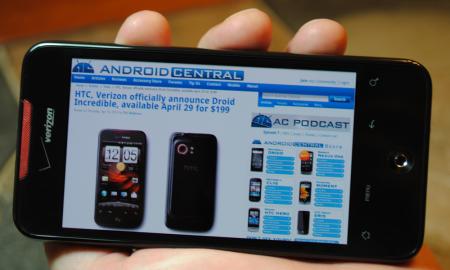
HTC includes its own browser in Sense. Like the stock Android browser, the Incredible's is Webkit-based (same as the iPhone's Safari browser, if you must know). Full Flash 10.1 support still isn't happening, though HTC has included Flash Lite. That means you can play some, but not all, Flash content. Otherwise, it's a competent and fast browser. Turn the phone sideways, and the browser quickly flips into landscape mode. Pages render well, and the browser scored 93 out of 100 on the Acid3 test.
And in case you were wondering, pinch-to-zoom is included in the browser and works just fine. (Same as in the photo gallery and Google Maps, too.)
Internet sharing
A major talking point for smartphones these days (at least for the Verizon Palm Pre Plus and the Sprint Evo 4G) is the ability to act as a WiFi hot spot, sharing the phone's 3G (or 4G, for the Evo) connection with other devices. The Incredible doesn't do that (so far as we know), but it does allow you to use Verizon's Mobile Broadband Connect service, tethering your phone to your computer via USB. At the time of this writing, the service costs either $15 or $30 a month, depending on your current data plan.
Music and movies
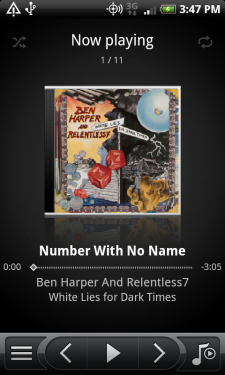
You've gotta do something with those 6.6GB of internal storage and that 8GB microSD card, right? The Incredible is a perfect platform to serve as your daily music and video player. (Though the upcoming Evo 4G beats it in screen size at 4.3 inches versus the Incredible's 3.7 inches, and it's a pretty big difference when you see them side by side.) HTC has included its custom music app and a couple of music widgets, and the stock Android music widget is there as well. There's no dedicated video player built in (save for the YouTube app), but videos play just fine nonetheless through the Gallery.
Is Sense better than stock Android?
We're pretty big fans of Sense. HTC's custom UI -- which has greatly evolved since its birth on Windows Mobile -- keeps getting better. But there are a few things we'd still like to see. HTC has a mail widget on the home screen by default, but it doesn't work with the native gmail app. And there's a pretty good chance if you're using an Android phone, you're also a gmail user.

Friend Stream is a welcome addition, but (and this goes for any UI that aggregates the major social networking services) it can become nearly unusable if you follow more than a handful of people on Twitter and Facebook. The number of status updates can be overwhelming to have in a single stream. While you can choose which updates will appear in Friend Stream, it kind of defeats the purpose of aggregation if you have to turn off what's being aggregated. That's not to say Friend Stream is a bad app or a bad premise. It's just not going to be for everyone. Same goes for HTC's Peep app. It has basic Twitter functionality, but there are many better Twitter clients available.
But those are nitpicks. Sense in and of itself is as usable as ever. We worry a little about having too many choices -- the number of homescreens and widgets and how they all interact can be a daunting to someone new to the platform. But that's not necessarily Sense's fault, and it does a good job of making things easy on the eyes and easy to use.
The short-short version is this: We like Sense. A lot.
The camera
The Incredible has an 8MP camera, which is about the highest resolution you can find in a smartphone these days. If for some reason you don't want to shoot at the full 8MP, you can ratchet the res back to 5MP, 3MP, 1MP or "small" at 640x384. The camera software is the same as on the HTC Desire, and it's been ported onto the Nexus One, too. (Read our quick review of the camera software.) You get a nice mix of options and functionality.


Taking a picture is as easy as launching the app and pressing the button on the face of the phone. Or, you can touch the screen to manually choose the focal point (which is followed by the sound of a shutter moving -- nice touch). You also can choose brightness and ISO settings, add one of a handful of effects, add geotagging location information, or use the self-timer. That's a lot of functionality in a smartphone camera.
Note: By default, photos are saved to those 6.6 gigabytes of internal memory, and not on the microSD card. You can change that in the settings.
And speaking of the photos, they're about as good as any we've seen from an smartphone camera. Colors are crisp and well-reproduced. Macro (close-up) was excellent. Low light was about what you'd expect. It's still not going to replace your DSLR, but the Incredible can serve as a pretty decent point-and-shoot camera.



As for video, it's on par with cell phone video. It shoots at a resolution of 640x480 pixels by default or 800x480, so you don't get the full 8MP like you do with still shots. It'll do, but you're not going to want to throw out your video camera just yet.
Video test at 640x480
Video test at 800x480
Other odds and ends
- Phone calls: This isn't really something we worry about much anymore. Verizon's network has proven solid over a couple days of use.
- Data: Same goes for data.
- GPS: The Incredible can pinpoint your location with full assisted GPS, and it can use WiFi and cell towers to get a ballpark location and help speed satellite acquisition. In our testing, either way worked fast in Google Maps.
- Bluetooth: Love how easy this has become in the past year or so. Turn on Bluetooth, tell it to scan for devices, and it does all the work. No needing to type in pairing codes. (Pssssst: The default code is almost always 0000.)
- YouTube: Android's app is on board, and it works fine.
- TV Out: In the Sound & Display settings menu, there's a TV out setting. From there you can choose orientation (portrait, landscape or auto), and the format (NTSC-M, NTSC-J, etc.). We're still trying to track down the details on this. As there's no HDMI port, anything would have to go through the microUSB port.
What about business users?
The Incredible does just fine with the usual business documents. Quickoffice can open Excel and Word documents just fine, and the PDF Viewer app does just what its name implies. That said, you're not going to be doing any editing with either of these apps. It's read-only. If you need to really get some work done, you're going to have to get a third-party app like Documents to Go.
As far as e-mail goes, Sense has Exchange support built in, if that's what you use. And if your business uses Google Apps for its e-mail, you're set. Just add it as an account in the gmail app. (Google Docs are still a work in progress, unfortunately.)
Conclusion
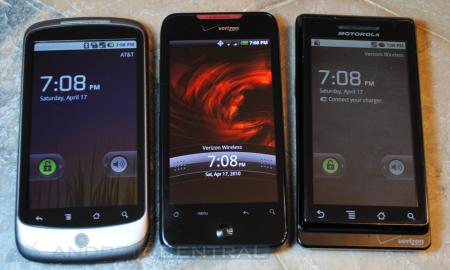
The Incredible feels familiar, despite being the first of the new generation of HTC phones (not counting the Google Nexus One) to arrive in the United States. That's a tribute to the relationship between Sense and the Android operating system. If you have used Sense in the past, you'll be fine with the new version. If you're coming from stock Android, you'll be able to navigate Sense with ease.
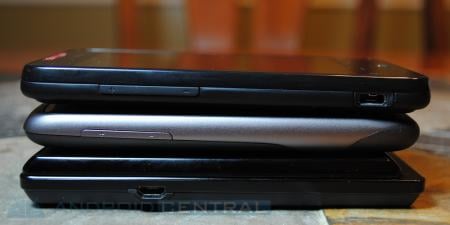
Clearly, some tough decisions will need to be made over the coming weeks and months. For Verizon customers, it'll be between the Incredible and the Google Nexus One (if and when it's ever released). That's until the next great phone is announced. Sprint fans waiting for the Evo 4G to arrive in a couple months may well be tempted by Incredible, trading WiMax, a front-facing camera and the ability to act as an 8-device WiFi hotspot. (If you need help choosing, check out this chart.)
And then there are the phones that we don't even know about yet. There's always something bigger and better over the horizon, right?
For our money -- $199.99 after a two-year contract and $100 rebate -- the Incredible quickly has made itself the Android smartphone to beat, at least in the United States, and at least until the Evo 4G arrives. And even then, it's going to be a tough battle.

